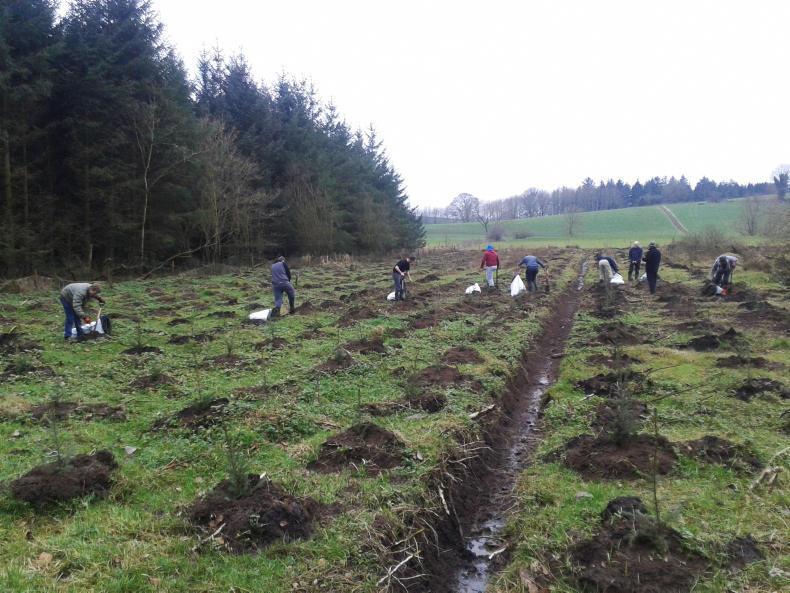Forestry training has changed significantly in Ireland, especially since the mid-1990s when the national afforestation programme shifted from the state to the private sector. While Coillte is still the dominant player in timber production, this too is changing as private sector log supply is forecast to exceed Coillte production within 10 years.
Education and opportunities
While sufficient third-level forestry education degree courses are provided in UCD and Waterford IT, the number of opportunities for forestry contractors and their workforce is limited. This article focuses on training for forest establishment and maintenance rather than harvesting which has been covered previously.
At the moment, the bulk of forest worker training is carried out by contractors on site with courses on specialist work organised by external agencies. “Holding on to staff is a major problem especially when you consider the time spent on training the workforce for the wide range of jobs in forest management and maintenance,” maintained Jerome Browne, forestry contractor.
“For example, my own company Scartaglin Forestry Services trained a number of staff over the past nine years since the collapse of the construction sector. These included a tiler, block layer and carpenter but these have now returned to construction, which is attracting more and more skilled forest workers.”
State support welcomed
He would welcome greater state support for training staff. “Training today goes beyond showing staff how to plant, fence, spray and carry out the other operations in forest establishment and maintenance,” he said. “Training certification is required for highly skilled work to ensure that the required standards are achieved in health and safety, environmental protection and other aspects of forestry work.”
So what formal courses are available to attract people to establish contract companies or work for contractors? Teagasc and Coillte have been involved in training forestry operatives for a number of years to carry out forest establishment, maintenance, harvesting and other related work.
Ballyhaise
Teagasc has five agricultural training colleges including Ballyhaise, Co Cavan, which has a forestry faculty. This provides Level 5 and 6 certified courses which cover a range of forestry skills to Quality and Qualifications Ireland (QQI) standards.
“Our forestry certificate course is open to anybody over 17 years and we get a wide range of students from different backgrounds and varying ages,” said Marianne Lyons, college lecturer.
“The one-year Level 5 course is an ideal introduction or starting point for forestry with links to progress to higher level courses if wished,” she said.
The course is full-time from September to May including an eight-week work placement programme during March and April.
“Some students use this as an opportunity to make contacts and several have stayed on with the employer having finished the course,” she maintained.
“There are many opportunities to get employment and the majority of our graduates secure regular work in their chosen area of forestry.” she said.
Graduated students
When students finish Level 5 they can return to the forest as forest operatives or move to Level 6 for further education and eventually, if they wish, apply to enter the Waterford IT degree course.
Those interested in the Ballyhaise course need to apply before June next year and prospective students are interviewed in July, with up to 18 places available.
However, over the coming months, it might be worthwhile to avail of practical experience of forestry which, according to Marianne Lyons, will be taken into consideration at the interview stage.
“It is not a requirement to have completed the Leaving Certificate but it would be a definite advantage,” she said.
Tuition fees are currently grant-aided for all EU citizens but students need to cover the cost of course material, field trips and registration, which is approximately €800. Further information is available at www.teagasc.ie/education/courses/forestry.
Coillte
Coillte’s training unit organised its own highly regarded in-house training courses for a number of years for company and external operatives.
This has been disbanded because “the majority of the training services provided by Coillte were to other sectors and we deemed that it was no longer core to our business,” said Michael Lally, human resources director with Coillte.
“However, we absolutely have a role to play and remain fully committed to supporting training and development in the forestry sector,” he said.
He listed the courses that Coillte will organise in future but which will be carried out by an external provider. These include cultivation, planting, reforestation, ATV and tractor operator courses, strimmer use and fencing.
“Both City & Guild and Lantra [the UK-based provider] are very supportive of working with us to create new standardised and certified courses,” he maintained.
He said that Coillte has identified a specific gap for training suppliers and is making forests available as ideal chainsaw and harvesting training sites. “In conjunction with Ballyhaise College, we are trialling a harvester and forwarder machine operator training internship.”
Partnership
The Coillte training programme will partially satisfy a need for specialist courses, not currently on offer in Ballyhaise. However, Marianne Lyons said that filling this need for short-term part-time standalone courses “is something that we would be interested in doing, subject to resources becoming available”.
It is a development by Teagasc and the Forest Service that could be supported as a partnership programme with Coillte, private contractors, forestry companies and forestry producer groups.
The goal should be to ensure that forestry is an attractive and well-paid career for contractors and their workforce. This is required to enable forestry to compete with alternative employment opportunities, especially construction as outlined by Jerome Browne.
Watch: new Hen Harrier Scheme being developed on farms
Listen: Burren farmers look to next CAPListen: Burren farmers look to next CAP
